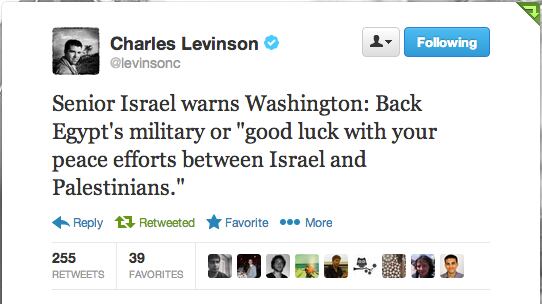Despite a dearth of public, on the record statements, the Israelis have made no secret of their support for the military government in Cairo—even stepping up their lobbying on behalf of Egypt's generals after the bloody crackdown against the Muslim Brotherhood. The Jewish state finds itself entrenched as part of the region's counter-revolutionary axis, along with the United Arab Emirate and Saudi Arabia. And Israeli officials, at least on background, seem quite pleased about it: "A senior Israeli official called the anti-Muslim Brotherhood nations 'the axis of reason'," reported the Wall Street Journal.
The same official, apparently, made a statement to the Journal's Charles Levinson that seemed quite shocking at first blush. The remark didn't make the paper, but Levinson, immediately after tweeting the "axis of reason" line, posted to his Twitter timeline this gem: "Senior Israel [official] warns Washington: Back Egypt's military or 'good luck with your peace efforts between Israel and Palestinians'."

Initially, that may look like a sort of blackmail, but that's not quite right. "It wasn't an overt, explicit threat that Israel would end peace talks if the U.S. didn't back Egypt's military," Levinson explained on a video posted to the Journal's website. "But what the Israeli position is, is that, look, Egypt and Saudi have historically, and still today, played very crucial roles in supporting negotiations and giving Palestinian support they need to stay in negotiations and make concessions. And this official basically said, Look, if you lose Egypt, if you alienate Egypt, and you lose Saudi, good luck in the peace talks."Levinson pointed to the the SInai Peninsula, the restive swath of desert that links Israel to Egypt. In the two and a half years since the fall of Mubarak's regime, instability in the Sinai has soared. The chaos has proved a direct threat to Israel, at various junctures, and can and should remain an Israeli security priority. But it's taken on a larger significance: the Sinai has become an oft-cited reason to maintain American aid to Egypt. The links to American aid and promised stability, though, seem tenuous.
No one should be surprised that there's little love lost between the Israelis and the Brotherhood, an organization known to be deeply opposed to Israel and dabble not infrequently in anti-Semitism. But a closer look at the recent history of the Brotherhood's brief tenure reveals a more mixed picture. In a piece in Foreign Affairs, Zack Gold concisely summarized much of this history and suggested that Israel may come to regret siding with the military and its crackdowns. "Egypt works with Israel because security cooperation in Sinai protects Egyptian lives, property, and territory," he wrote. "This will remain true whether or not the Americans cut the generals loose." Moreover, Tamarod, the group that spearheaded the late-June protests that resulted in Morsi's ouster, have denounced the peace-treaty with Israel; and the Brotherhood's anti-Israel rhetoric has taken on its old prominence. Then there's the likely radicalization of Islamists—including the Brotherhood—after the crackdown, a potential drain on the military's resources.
This brings us back to Israel's support for Egypt's new military government and its ostensible link to the peace process. It's past time realize that no Egyptian government will bring perfect security to Israel. For that matter, nor will any foreseeable Palestinian state, and neither has Israel's occupation of Palestinian territories, whether control is at its most militarized or loosed in declared attempts to ease Palestinians' woes. But the notion that perfect security is a myth doesn't speak to what seems like the most glaring oversight in the Israeli position.
"Only after stability is restored, only after law and order is enforced, only then can you start to talk about launching a process that leads to more democratic processes," the Israeli official told the Journal. "First, save what you can, and then deal with democracy and freedom and so on," another—or perhaps the same—official told the New York Times. How long would such a state persist? The last time Egypt's generals seized power, they kept it for decades. Would that be long enough to broker and implement a Palestinian-Israeli peace accord (which, needless to say, stands as a long shot already)?
The pro-putschist camp "just doesn’t understand how the region, and how Egypt specifically, has changed," Michael W. Hanna, an Egypt expert with the Century Foundation, told Matt Duss in the Prospect. "Repressive stability is no longer stabilizing." Barack Obama made a similar remark in a May 2011 speech about the Arab Spring. "Societies held together by fear and repression may offer the illusion of stability for a time, but they are built upon fault lines that will eventually tear asunder," he said. Duss, in is piece, concluded: "What tragedy will it take for us to re-learn that lesson?"
The stability the military purports to bring to Egypt is a mirage; seeking shelter in its cool waters will prove disastrous. Israel may, in the name of the peace process, want to lead America to drink at that well, but soon enough the waters will give way to sands as dry as the Sinai's. How long will the journey last before everyone realizes they've been making a bee line for an illusion?






